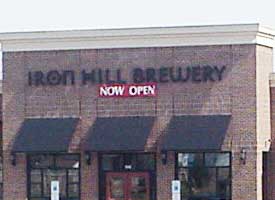
WARREN, MICHIGAN
Per capita, Warren’s one of the greatest suburban brewpub meccas (visited August-September ’04, July ’05, August ’06), flaunting 11 Mile Road’s DRAGONMEAD and Chicago Road’s
KUHNHENN BREWING, tiny inconspicuous freestanding venues with a no-frills approach just a few miles west of Detroit (although top picture shows significantly larger, newly designed second location in Clinton).
KUHNHENN, which is also a winery featuring Chamblaise, Chardonnay, Dry Italian, Bourgeron Blanc, and Riesling styles, brews rotating fruit ales as well as Belgian-Scotch ales and stouts.
On my first visit, tasted KUHNHENN’S deeply citric-hopped bitter
Loonie Kuhnie Pale Ale, ripe stoned-fruited coriander-spiced chamomile-backed Belgian-styled
Tangerine Wit and diacetyl hop-softened apricot-dried kiwi-tinged
Peach Apricot.
Soapy berry-tart
Wild Blueberry Pancake Ale may've been lackadaisical, but the rest of this night's fare was distinguished.
Sticky pine-resinous fruit-hopped
IPA, tangy orange-bruised
Oktoberfest, mild espresso-doused
Stout and extraordinary barrel-aged whiskey-licked Cognac-smitten barleywine-swooned
A Few Shillings Too Many Scotch Ale (a cherry-ripened 12.5% alcohol bomb) ruled the roost.
Listed in Beer Index are supreme bottled versions of Kuhnhenn Simcoe Silly, Heather Ale, Devils Horn, Tangerine Wit, American IPA, Kuhnhenn 9 Belgian-style Abbey Ale, Kuhnhenn Blackberry Porter, etc.
Second trip in July ’05, tried syrupy malt-sticky orange-bruised cherry-pied
Maibock, peat malt-smoked, ice coffee-smeared, black cherry-veered, soft hop-seared
Penetration Porter, medicinal, caramel-malted, Cognac-burgundy-bitten
Fourth Dementia, smoky, tea-like, chocolate-roasted, tangerine-fruited, currant-sharp
Iron Monger Dunkel and lemony orange-pepped, leafy hop-softened
Hefeweizen (with its surging banana-clove sweetness).
Outstanding dessert beer,
Crème Brulee Java Stout, glided meringue-like cappuccino thickness atop caramel-burnt black chocolate éclair, buttery cocoa, coffee bean, raspberry puree, overripe cherry, and charred cedar illusions.

During August ’06 trip, met owner Eric Kuhnhenn, whose sons (Eric and Brett) continue to impress as first-rate brewmasters exploring the outer limits of beer making. At Ypsilanti’s Summer Beer Festival, the brothers experimented successfully with its limited "Kuhnhenn Kandy Land" line, featuring confectionery renditions like Red Hots Rye Ale, Candy Apple Ale, Junior Mint Chocolate Stout, Tootsie Royal Beer, and Double Chocolate Cherry Cream Stout.
New finds on this 3-hour stop included barleywine-like soother
Anneliese Amber, a caramel malted sweetie with nifty mandarin orange, banana, and quince sequence. Not to be outdone, Belgian-styled
Nine 10.5% Dark Strong Ale rushed cherry-bruised banana-bruised grape-soured fruiting into cedar-lacquered sherry-soaked chocolate liqueur whir.
Bourbon-cognac illusions deepened cocoa-buttered hazelnut-centered cherry-bruised wood-drenched heavyweight
Bourbon-Barrel Fourth Dimension Olde Strong Ale.
For dessert, quaffed unendingly raspberry-tart, apple-candied, Scotch-malted, brown chocolate-y, maple-sugared
Raspberry Eisbock.
www.kbrewery.com
 WEST CHESTER AREA, PENNSYLVANIA
10 miles northwest of Philadelphia, North Wales’ red-bricked black-awninged IRON HILL BREWERY is located inside The Shoppe At English Village, visited September ’07.
Redwood furnishings brought elegance to right and left side dining (with glass-encased brew tanks set behind), center square bar with twin TV’s, and rear open hearth serving pizza-sandwiches. Quaffed creamy-yet-phenol yellow-fruited grassy-hopped gourd-lurked Oktoberfest.
www.ironhillbrewery.com
WEST CHESTER AREA, PENNSYLVANIA
10 miles northwest of Philadelphia, North Wales’ red-bricked black-awninged IRON HILL BREWERY is located inside The Shoppe At English Village, visited September ’07.
Redwood furnishings brought elegance to right and left side dining (with glass-encased brew tanks set behind), center square bar with twin TV’s, and rear open hearth serving pizza-sandwiches. Quaffed creamy-yet-phenol yellow-fruited grassy-hopped gourd-lurked Oktoberfest.
www.ironhillbrewery.com  WEST CHESTER AREA, PENNSYLVANIA
10 miles northwest of Philadelphia, North Wales’ red-bricked black-awninged IRON HILL BREWERY is located inside The Shoppe At English Village, visited September ’07.
Redwood furnishings brought elegance to right and left side dining (with glass-encased brew tanks set behind), center square bar with twin TV’s, and rear open hearth serving pizza-sandwiches. Quaffed creamy-yet-phenol yellow-fruited grassy-hopped gourd-lurked Oktoberfest.
www.ironhillbrewery.com
WEST CHESTER AREA, PENNSYLVANIA
10 miles northwest of Philadelphia, North Wales’ red-bricked black-awninged IRON HILL BREWERY is located inside The Shoppe At English Village, visited September ’07.
Redwood furnishings brought elegance to right and left side dining (with glass-encased brew tanks set behind), center square bar with twin TV’s, and rear open hearth serving pizza-sandwiches. Quaffed creamy-yet-phenol yellow-fruited grassy-hopped gourd-lurked Oktoberfest.
www.ironhillbrewery.com 

 BRISTOL, VERMONT
Amongst old red brick buildings in the heart of rural Bristol (thirty miles Southeast of Burlington) lies THE BOBCAT CAFE, a quaint upscale pub with creaky wood floors-tables, cozy right side dining, and tucked-in left side bar.
Visited November ’06, glass-enclosed rear brew tanks served decent fare such as diacetyl maize-dried perfume-wafted floral-hopped Pocock Pilsner, saltine apricot-soured cornbread-bottomed Cat Paw Kolsch, sweet herbal tea-like Bristol Pride ESB, corn-sweet yellow-orange-fruited Witches Brew Octoberfest and daintily red-orange-fruited woody-hopped floral-dried bitter App-Gap India Pale Ale.
Bettering these selections was milk chocolate-y maple-tarred anise-zipped char-hopped South Mountain Stout. But honeyed dark-spiced fig-soured black tea-finishing Brickwall Pale Ale had off-putting vegetal spoilage.
BRISTOL, VERMONT
Amongst old red brick buildings in the heart of rural Bristol (thirty miles Southeast of Burlington) lies THE BOBCAT CAFE, a quaint upscale pub with creaky wood floors-tables, cozy right side dining, and tucked-in left side bar.
Visited November ’06, glass-enclosed rear brew tanks served decent fare such as diacetyl maize-dried perfume-wafted floral-hopped Pocock Pilsner, saltine apricot-soured cornbread-bottomed Cat Paw Kolsch, sweet herbal tea-like Bristol Pride ESB, corn-sweet yellow-orange-fruited Witches Brew Octoberfest and daintily red-orange-fruited woody-hopped floral-dried bitter App-Gap India Pale Ale.
Bettering these selections was milk chocolate-y maple-tarred anise-zipped char-hopped South Mountain Stout. But honeyed dark-spiced fig-soured black tea-finishing Brickwall Pale Ale had off-putting vegetal spoilage.

